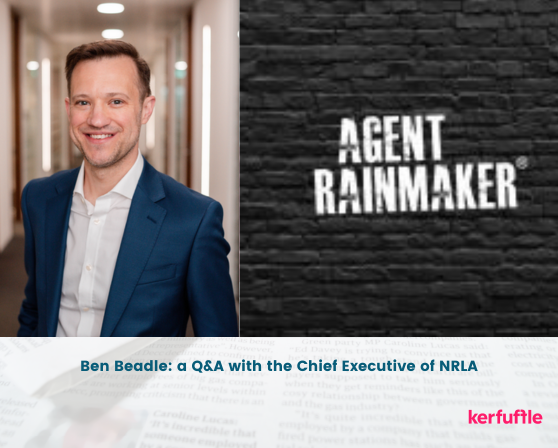Ben Beadle: a Q&A with the Chief Executive of NRLA
This November, Ben Beadle will be one of the experts stepping on to the Agent Rainmaker Live stage for our panel discussing the biggest challenges in the industry right now.
Ben is the Chief Executive of the National Residential Landlords Association so is well placed to talk about these challenges – as well as offering up suggestions about how agents can overcome them and continue working hand in hand with landlords to achieve success.
Ahead of the event, the Agent Rainmaker team caught up with Ben to get an insight into his work at the NRLA and some of the most-talked about industry news. Here’s what he had to say:
Could you tell us a little about your role and the impact of the work the NRLA does?
“The NRLA is the voice of private residential landlords, supporting over 105,000 members across England and Wales to campaign for a PRS that works for all.
“Amongst our many services, we provide our members (which includes landlords of all sizes, and letting agents) with sector-leading training and professional expertise. Our offering includes access to an advice line and a library of documentation, as well as access to letting and management tools to help our members navigate the complex and shifting regulatory regime which governs the private rented sector.
“I took up my post in 2019 to oversee the NLA and RLA’s merger and harness the collective membership’s campaigning capacity, with the ambition to create a louder voice for our members.
“From supporting landlords through the Covid-19 pandemic to launching Portfolio, our own property management platform earlier this year and, most recently, acquiring property certification business Safe2, I have fought relentlessly to make the PRS a better place for both landlords and tenants.”
It's reported 82% of landlords are self-managing their portfolios, what are some of the reasons you think so many are choosing not to use a letting agent?
“The main reasons landlords opt not to use an agent are due to costs and dissatisfaction with service levels. Dissatisfaction with response times for dealing with repairs and communication with tenants stand out as particular areas of concern for them. Professionalisation of the sector means that landlords are increasingly seeking to provide a high level of service, and many feel they are best equipped to do this directly.
“However, recent data from Uswitch suggests that more landlords are considering using an agent (63% of those responding to a recent survey).
“We surveyed our members last year to find out about their experiences of using an agent and what their ideal model is. We found that around half (49%) use an agent for some aspect of letting.
“We also found that, of those who used an agent, the same proportion (50%) had recently switched agents. The most cited reasons for doing so were dissatisfaction with the time taken to respond to requests (38%) and high fees (26%).
“We’ve also considered this issue from a tenant perspective, and self-managing landlords tend to rate higher for tenant satisfaction.
“When asked to rate their landlord out of ten (ten being the highest), 63% of tenants scored independent landlords an eight or more. This fell to 48% for corporate landlords and managing agents (NRLA Tenant Survey 2022). This may be down to several reasons, including higher property standards maintained by self-managing landlords and less frequent rent increases.”
What are the most important things letting agents could be doing to support landlords, especially during the current industry challenges?
“It is becoming more costly and more challenging to be a landlord. Agents must acknowledge these pressures and look to provide support where it’s needed. This will differ from landlord to landlord, as each will have a different business model and expectations, so it is crucial that agents understand the motivations of their clients.
“Satisfaction with costs and service levels are the driving factors that influence a landlord’s decision to self-manage or use an agent, so agents need to ensure they are providing cost efficiencies alongside exceptional service if they are to win over self-managing landlords.
“Ultimately, our sector is still driven by the same thing that has dominated it for the past century – people. But now there is much greater transparency and higher customer expectation. Modern communication makes it unacceptable to operate in anything other than real time and agents must remain focused on what both landlords and tenants want from it.”
Is there one industry challenge that you see landlords talking about the most - or one issue which you think landlords are finding particularly challenging in 2023?
“We have a lot of unknowns hanging over us – more than at any other time in the modern PRS’s existence. Of course, the ‘biggie’ is rental reform. We have a Bill making little to no progress through Parliament and the prospect of a general election on the horizon.
“Our data suggests that most landlords can envisage operating without Section 21, but only if the courts are reformed and sufficiently resourced to provide certainty of possession if or when it is needed.
“We also have a cohort of landlords operating in the student housing sector who, under the Government’s proposed reforms, will not be able to guarantee that a property will be available for incoming tenants at the start of an academic year.
“On top of this we have continued uncertainty on energy efficiency. Whilst the Government’s recent announcement to scrap its plans to introduce more requirements for landlords provides an immediate reprieve, net zero is still a government commitment and we need a clear strategy alongside sustained support to ensure the sector is equipped to make the changes necessary.”
There have been lots of reports of landlords choosing to sell their properties, is this something you're seeing a lot of? And conversely, are many of the landlords you're in touch with actually growing their portfolios at the moment?
“Despite continued, strong demand and rising rents – a market crying out for investment – our data shows landlord confidence is at a record low, surpassing even that recorded at the outset of the Covid-19 pandemic (NRLA Landlord Confidence Index).
“Proposed acquisition is low, with just 8% of landlords surveyed intending to invest in property in the next year. Alongside this, planned divestment is rising – 37% of landlords plan to sell in the next twelve months (Q2 2023, BVA-BDRC).
“Much of the supply shortage can be tracked back to changes in mortgage interest relief (MIR). Modelling commissioned by the NRLA demonstrates that between 2010 and 2016, the stock of private rented homes increased by 3.7% per year. Between 2017 and 2021, when changes to MIR were phased-in, stock increased by just 0.4% per year.
“So, we have more than half a decade of stifled investment now coupled with increasing propensity to sell. That said, when it comes to divestment, landlord behaviour differs between portfolio sizes and location. Almost a quarter (22%) of landlords planning to divest are disposing of property in the South-East (excluding London). Just 4% are looking to sell properties in the North-East.”
Many agents are looking into PropTech and AI - is the increased use of technology to support the management of rental properties something you think landlords are welcoming?
“Definitely. The increased complexity of legislation coupled with higher tenant expectations means that landlords are always seeking smarter ways to manage their properties – whether that’s to ensure compliance or better communicate with their tenants.
“Tight margins and a lack of consumer choice drives innovation and a new way to market, sell, let, and manage – all of which reduces marginal costs. What remains restrictive is led by monetary policy and scarcity of property.
“But PropTech innovation must not lose sight of the needs of landlords and tenants – we’re still a people-oriented sector and while PropTech can enhance efficiencies and improve customer service, it must provide solutions to overcome barriers rather than solutions desperately seeking problems. This is something that is very relevant for us at the moment. We have made a deliberate decision to invest in technology across our business and also for our members – we intend to digitise the landlord journey starting with our investment in Portfolio and Safe2. And we will acquire more business that we believe will derive benefits for our members.”
What's the one piece of advice you'd give to letting agents who are looking to grow their business and attract new landlords who may previously have been self-managing?
“It’s an uncertain time for the sector - the only thing that does seem certain is strong tenant demand. Agents providing certainty, risk mitigation and a consistent level of service is going to be key. Underlying this is the critical need for agents to be experts and to be engaged in the development of policy and legislation.”
For more insights from Ben and a range of his fellow industry experts, ensure you’ve got a ticket to this year’s Agent Rainmaker Live!
Find out more about Agent Rainmaker here: https://www.kerfuffle.com/suppliers/agent-rainmaker





